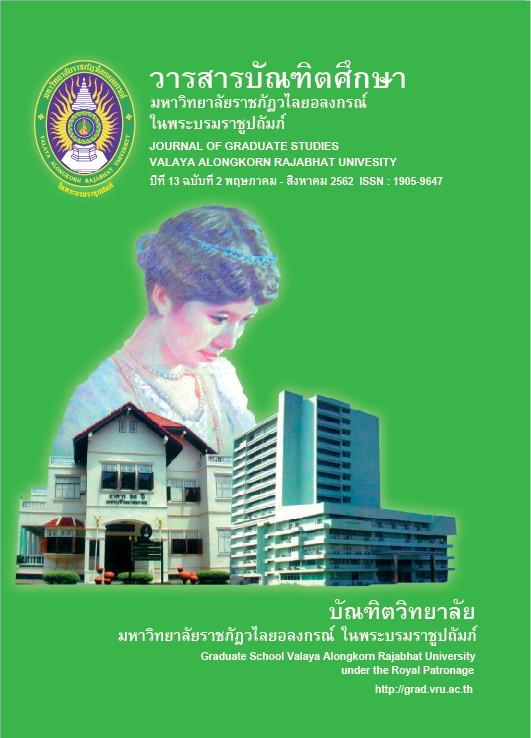PROJECT BASED LEARNING FOR INTEGRATION PARALLEL SUBJECT COURSE WORK IN BACHELOR’S DEGREE STUDENTS
Main Article Content
Abstract
The objectives of this research were: 1) to study project based learning for integration parallel subject course work in bachelor’s degree students, 2) to evaluate project based learning for integration parallel subject course work in bachelor’s degree students, and 3) to study the students’ satisfaction by project based learning for integration parallel subject course work in bachelor’s degree students. The target group included 36 students with purposive sampling in 3D Sculpting Subject, 1st Semester 2560 Academic Year, Major Animation and Multimedia, Faculty of Science and Technology, Bansomdejchaopraya Rajabhat University. The tools in this research were: 1) lesson plans in 3D Sculpting Subject and Graphic Design Principle Subject, 2) Rubric Score evaluate form in practical skills, 3) learning achievement score form, 4) Satisfaction Assessment Form. The Statistic use in this research are percentage and mean. The research findings found that: 1) the result of project based learning for integration parallel subject course work include 7 steps which make students have an understanding the process of producing 3D modelling and texturing. Students can learn how to research and analyze information to Create self-knowledge. They also know the problems and obstacles in learning process and give solutions to problems. 2) The evaluation result of project based learning found that students have done their projects according to their interests that can encourage learners to become interested in learning. Integration of courses corresponding work make student have self-learning ability, gaining more experience and knowledge from researching, as well as groups discussing and presenting works, also the score are increased. The average results of the 3D Sculpture subject learning achievement score were 65.11 points, 52.78% have higher score than average score and Graphic Design Principles subject, the average score was 68.47 points, 63.89% had a higher score than the average score. 3) The satisfaction rating was at a high level.
Article Details

This work is licensed under a Creative Commons Attribution-NonCommercial-NoDerivatives 4.0 International License.
บทความทุกเรื่องได้รับการตรวจความถูกต้องทางวิชาการโดยผู้ทรงคุณวุฒิ ทรรศนะและข้อคิดเห็นในบทความ Journal of Global of Perspectives in Humanities and Social Sciences (J-GPHSS) มิใช่เป็นทรรศนะและความคิดของผู้จัดทำจึงมิใช่ความรับผิดชอบของบัณฑิตวิทยาลัย มหาวิทยาลัยราชภัฏวไลยอลงกรณ์ ในพระบรมราชูปถัมภ์ กองบรรณาธิการไม่สงวนสิทธิ์การคัดลอก แต่ให้อ้างอิงแหล่งที่มา
References
Chokwattana, B. (2009). kānphalit bandit phư̄a sangkhom Thai nai wēthī lōk [Production of graduates for Thai society on the world stage]. Summary of the 7th National Academic Conference on the Development of the Integrated Science Network Thai higher education graduates: towards intellectual crystallization. Bangkok. Office of the Higher Education Commission.
Dachakub P., Yindeesuk P. & Meesri R. (2008). kānsō̜n khit dūai khrōng ngān : kān rīan kānsō̜n bǣp būranākān [Teaching Thinking with Projects: Integrated teaching]. Bangkok: Chulalongkorn University Press.
Ditjalean, C. & Tananchaibud, P. (2014). kānphatthanā khwāmkhit sāngsan læ phon samrit thāngkān rīan khō̜ng nakrīan chan matthayommasưksā pī thī hok dōi kānčhatkān rīanrū bǣp khrōng ngān tām nǣo khō̜n satrakchan ni sưm nai rāiwichā kān rīan prōkrǣm phamnā hunyon prayuk [Development of creativity and learning achievement of grade 12 students using project learning base on Constructionism theory of an apply robot subject]. Panyapiwat Journal. 5(2), 205-216.
Guzdial, M. (1998). Technological support for project-based learning. ASCD yearbook: Learning with technology, 14, 47-71.
Kemmis, S. & McTaggart, R. (1988). The action research planner. (3rd Ed.). Victoria; Deakin University Press.
Krajcovicova, B. & Capay, M. (2012) Project based education of computer science using cross-curricular relations. Procedia-Social and Behavioral Sciences, 47, 54-61.
Kwankaw, P., Wanitwasin, P. & Siripipattanakun, S. (2016). kānčhatkān rīan kānsō̜n dōi chai Project Based Learning thī mī tō̜ khwāmkhit sāngsan samrap naksưksā radap prakāsanīyabat wichāchīp chan sūng sākhā wichākān lēkhānukān [Development of Creative Characteristics usingProject-Based Learning (PjBL) for High Vocational Students of Program in Secretarial]. Journal of Southern Technology. 9(1),1-6.
Ministry of Education. (2007). nǣothāng kanpatirū kānsưksā khō̜ng krasūang sưksāthikān [Guidelines for Educational Reform of the Ministry of Education]. Bangkok: T.S.B. Product.
Ministry of Education. (2008). laksūt kǣn klāng kānsưksā naphư̄n thān Phutthasakkarāt sō̜ngphanhārō̜ihāsipʻet [Basic Education Core Curriculum, 2008]. 2008. Bangkok: Agricultural Cooperatives of Thailand.
Nitiswarapakrun, K., Piruntananon, N., & Chimlowlap, N. (2014). kānphatthanā rūpbǣp rāiwichā khū khanān nai rāiwichā phāsā ʻAngkrit phư̄a kān rōngrǣm nưng kap wichā lakkān rōngrǣm mahāwitthayālai rātchaphat phra nakhō̜n [Sequenced Courses Model Development Ofenglishfor Hotel 1 and Hotel Principles at Phranakhon Rajabhat University]. Phranakhon Rajabhat Research Journal. 9(1), 14-26.
Pranit, W. (2012). withī kānsāng kān rīanrū phư̄a sit nai satawat thī yīsipʻet [The way to create learning for students in the 21st century]. Bangkok: Sodsri Saritwong Foundation.
Sanapra, R. & Sum-Ang, R. (2016). phonkān čhatkān rīanrū bǣp khrōng ngān pen thān thī mī tō̜ thaksa kān rīanrū khan phư̄nthān nai satawat thī yīsipʻet rāiwichā fisik rư̄ang ngān læ phalangngān samrap nakrīan chan matthayommasưksā pī thī hā [The Effects of Project Based Learning on earning of Basic Skills in the 21stCentury Based on Physics of Work and Energy for Mathayomsuksa 5 students]. In Community-Based Research. (pp. 332-343). Phetchabun: Research and Development Institute Phetchabun Rajabhat University.
Tarkunsalit, W. (2008). nǣothāng kānčhatkān rīanrū bǣp khrōngkān [Project management approach]. Bangkok: MIT Printing limited partnership.
Soonthonroj, W. (2008). krabūankān rīanrū dōi khrōng ngān [Project learning process]. Kalasin: Prasan Printing.
Office of the Education Council. (2007). kānčhatkān rīanrū bǣp khrōng ngān [Project-based learning management]. Bangkok: Office of the Education Council.


